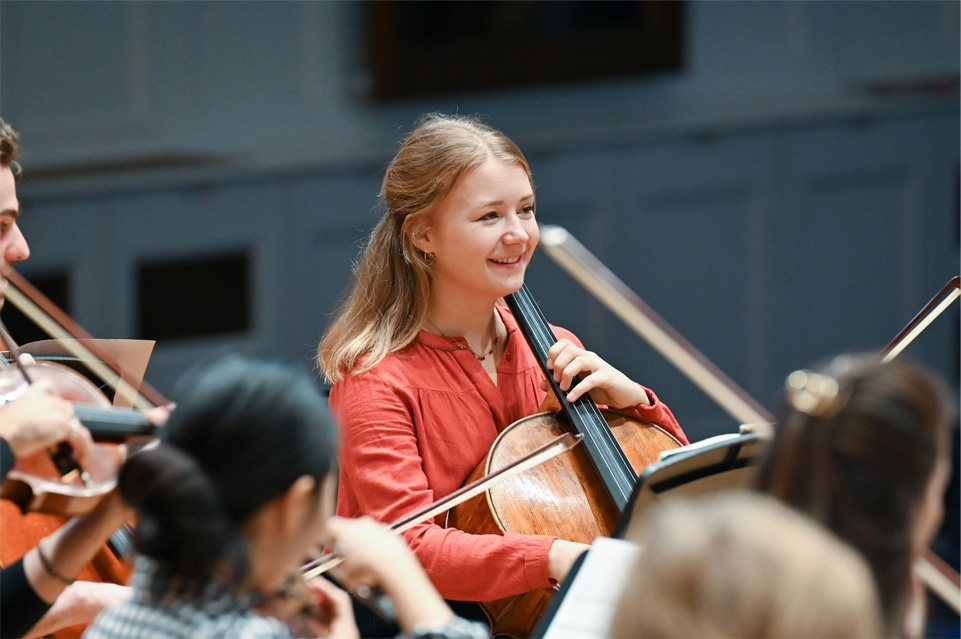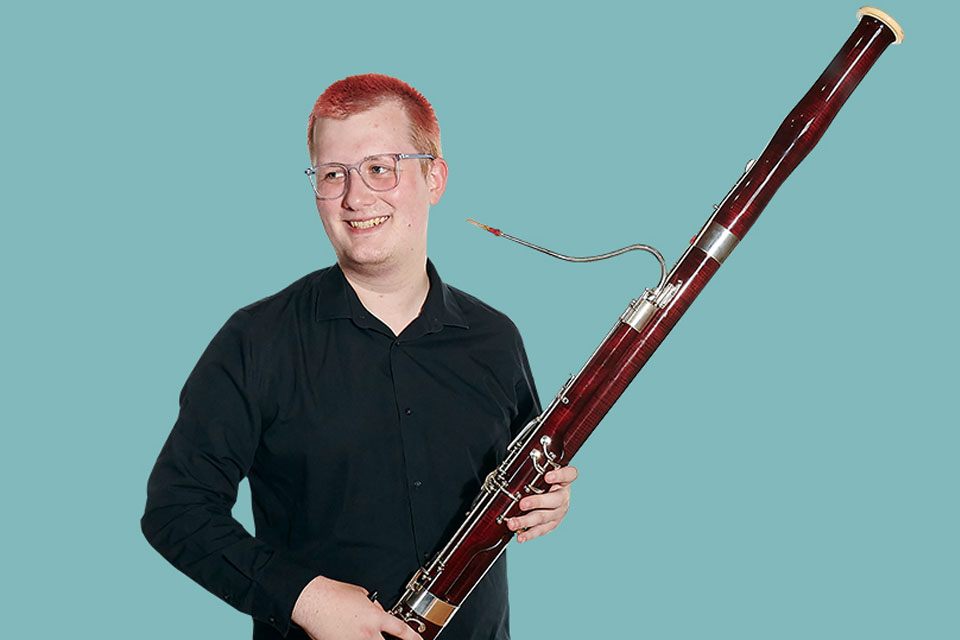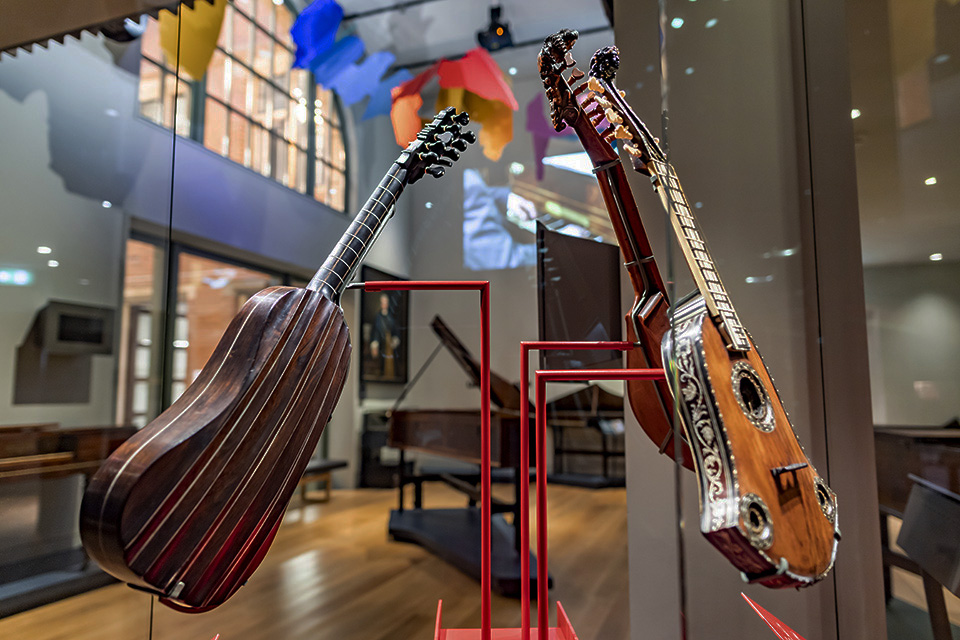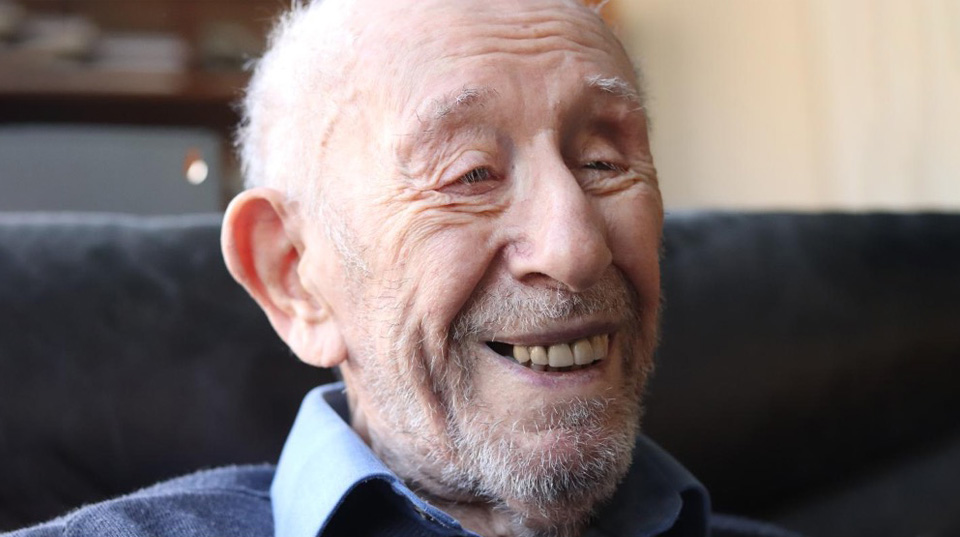
Eric Sanders, a Jewish man born in Vienna 1919, was a self-taught songwriter, who wrote many songs that were influenced by his emigration to Britain and his life experiences as a soldier and a music teacher in the late 1930's to 1960's.
Check out our story maps about Eric Sanders
Download sheet music and hear recordings
Author: Norbert Meyn
1. Introduction
Eric Sanders was born in a Jewish family in Vienna in 1919 as Erich Ignatz Schwarz. Erich received music lessons throughout his childhood and began to write songs with notable success. By the age of 17, he had written a musical play called ‘Rhythmus’. The show was accepted by the Theater an der Wien to be developed and performed with his name on the bill, and some of his songs were due to be published by Doblinger, a leading firm. However, persecuted by the Nazis because of their Jewish heritage, Erich and his family were forced to flee in 1938, and his dream of a career as a professional songwriter was shattered. Shortly before leaving Vienna, Erich went to collect his manuscripts from Doblinger.1
Erich’s mother had spent the First World War with her relations in Britain, and their previous connections helped them to find somewhere to stay. Erich anglicized his name to Eric Sanders and joined the British army to fight against the Nazis. He first joined the pioneer corps and then the Special Operations Executive (SOE). He was trained to fight behind enemy lines and stationed in Italy. After the war he returned to Austria and Germany as a translator for the British authorities, but he would never consider returning to live in Austria at the time.2 During teacher training he met his future wife Margaret, a fellow student. They settled in London and had two children, Paul, and Richard. Eric became a much-loved teacher, working for many years at North Paddington School, as well as an active member of the Labour Party. It was not until much later that he became reconciled with Austria and received Austrian citizenship and the Austrian Cross of Honour for Science and Art.
2. The background of Eric’s English songs and our journey from manuscript to arrangement and recording
Eric Sanders was introduced to me in late 2019, around the time of his 100th birthday, by Katalin Tünde Huber, who was then Director of the Austrian Cultural Forum in London. We had just started the large AHRC-funded research project ‘Music, Migration and Mobility’ - The Legacy of Migrant Musicians from Nazi Europe in Britain at the Royal College of Music in which the ACF was a partner. Eric was one of the very few remaining first-generation émigrés in London. I first met Eric at one of his favourite local restaurants in South London, El Chico’s in Norbury, in mid-December 2019, only a few days after his big birthday, and heard the story of the songs he wrote after his emigration to Britain.
During his time as a soldier in the 1940s, Eric played the piano in bands and bars, getting to know many popular wartime songs such as “We’ll meet again” (sung by Dame Vera Lynn). While playing the greatest hits of the time he also wrote songs himself, in a similar, popular style, reminiscent of Cole Porter or George Gershwin, for example. He also wrote the English texts himself, showing his impressive command of the language. He was a brilliant word smith and referred to himself as a ‘melody man’, confident in his ability to write a popular tune.3 Sadly Eric never had the opportunity to formally study composition and harmony. Instead, he taught himself as far as possible and used some sample chord progressions he had found to help him devise simple accompaniments which he could play, without ever writing them down.4 Therefor the manuscripts of his songs almost always contain only the melody and the text. Occasionally some simple chords are written in, and in a few cases, they are written out for the pianist, but in general the songs needed further harmonisation before they could be performed by somebody else. This may be the reason why his attempts to get his songs published failed. Even the songs that were accepted by the Theater and der Wien before his forced emigration had been harmonised by a professional arranger.
He continued to write songs in the 1950s, for example, for his wife Margaret and some of his students at an adult education school. In the 1960s, Eric realised that the style of popular songs had changed, making it less likely that anyone would be interested. He said that what made him stop was the new fashion of teenage songs in which it was quite common to use the same line 7 or 8 times.5 However, he continued to perform his songs himself on occasion and derived much joy from playing the piano well into his nineties.
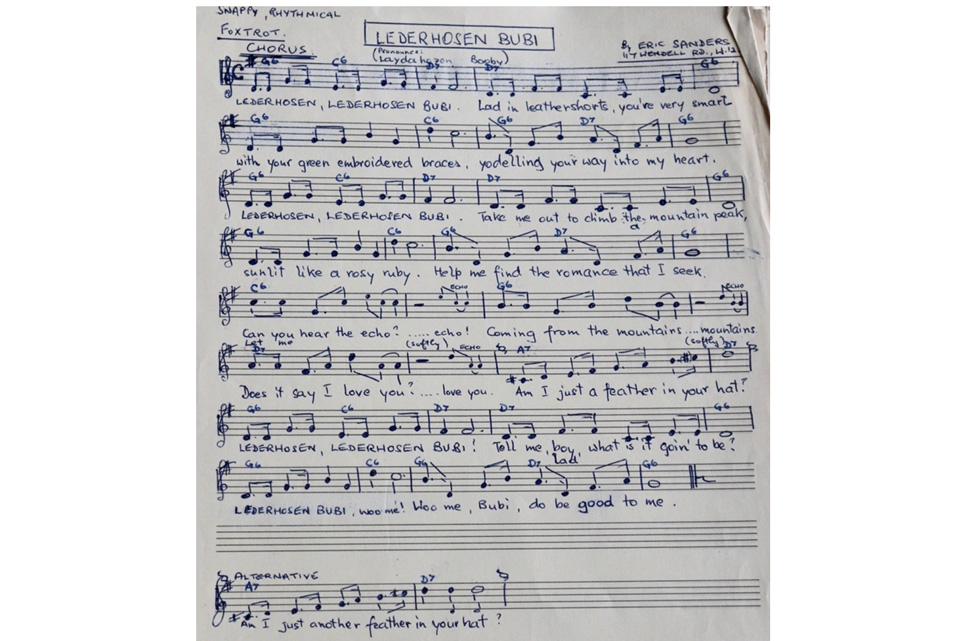
One of Eric’s manuscripts, with simple chords written above the melody
In early March 2020, a few weeks after the first meeting and just before the beginning of the COVID-19 pandemic, I visited Eric at his home, this time together with Michael Haas from ExilArte in Vienna (where the manuscripts of Eric’s songs are now part of the archival collections). Eric kindly gave permission for his manuscripts to be photographed, with a view to performing them as part of the Music, Migration and Mobility project. They were like a window into his past life, and, alongside his autobiographies and interviews he gave, could help us to understand his experience as a refugee and immigrant in Britain.
Most of the songs were notated only as a melody with a text, few had some chords written above, a handful had a simple piano accompaniment. During the first lockdown, I began to play and sing through some of the songs at home, admiring their wonderful quality and spirit. Then, in summer 2020, I asked RCM student composer Niklas Melcher to add simple chords to some of the songs, which enabled me to improvise an accompaniment and sing them to some of my colleagues over Zoom.
Encouraged by their reactions, I began looking for someone who could arrange and write proper piano accompaniments to the songs. I am grateful to the RCM’s Head of Piano Vanessa Latarche for introducing me to Dominic Doutney, who was studying for his artist diploma as a pianist at the time. Dominic began to work on a selection of songs for both male and female vocalists and with advice from the RCM’s Jazz Professor Mark Armstrong, we developed a fresh and accessible style of accompaniment that would place the songs recognisably in their period of conception, the 1940s and 50s.
In January 2021, we were ready to present some of Dominic’s musical ideas to Eric and met him on Zoom (he was 101 by then). Eric really appreciated the sophisticated harmonies and jazzy feel that Dominic brought to his songs, and he even offered to write a couple of new lines for a song (Rhythm of London) where a bridge section was needed. We were joined by mezzo-soprano Esme Bronwen-Smith, who had learned some of the songs written for a female singer.
Then, in July 2021, as soon as pandemic restrictions allowed, we rehearsed and recorded 15 songs in a small private studio north of London.
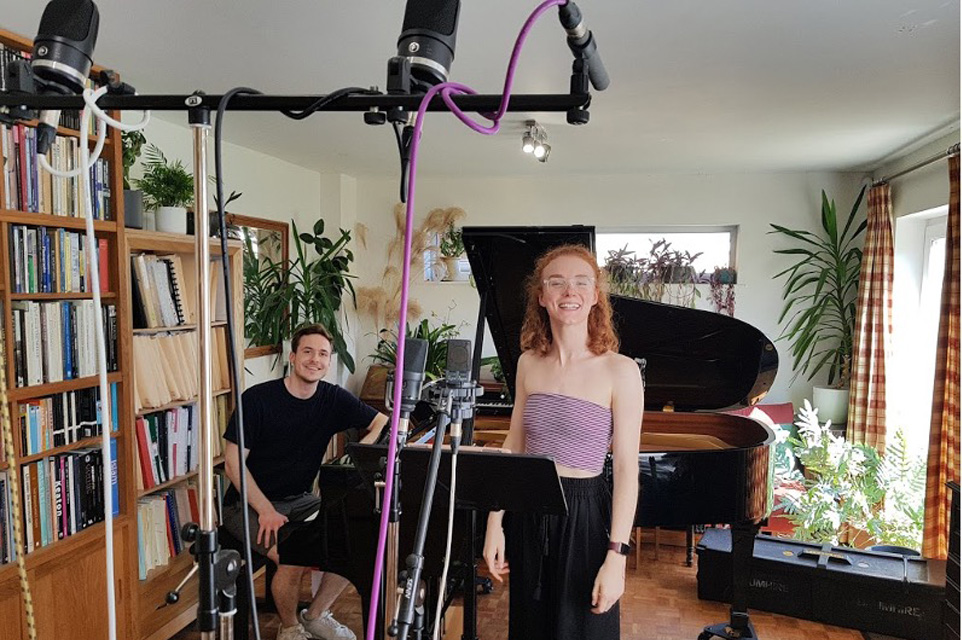
Dominic Doutney and Esme Bronwen-Smith during a recording session in July 2021 Image: Christopher Gould
The recordings were edited and on August 5, 2021, after further pandemic restrictions had been relaxed, Dominic and I were able to meet Eric at his home. We played most of the recording to him and, with his kind permission, recorded his memories as he spoke about the songs after hearing them.6 It was a memorable occasion for us and sadly the last time we saw him. He passed away on August 30, 2021.
Eric’s truly inspirational love for life, music and people lives on in his songs. They are a window into a time of great upheaval when a kind gesture, a personal encounter and an opportunity to dance and enjoy was cherished as something worth living and fighting for. They also reflect Eric’s mobile life between Britain and central Europe during and after the war and his experience as a new citizen of Britain, finding a new identity and embracing the building of a more just democracy after the war with enthusiasm.
The title of his German autobiography - ‘Emigration ins Leben’ (Emigration into life) captures this optimism. On the other hand, as Eric said during our last meeting, the experience of what the Nazis did in Vienna also cast a shadow over his life. The fact that despite this he was able to remain so positive, and ultimately prepared to re-engage with Austria and his love for his home city, Vienna, in later life, is perhaps his most humbling achievement.
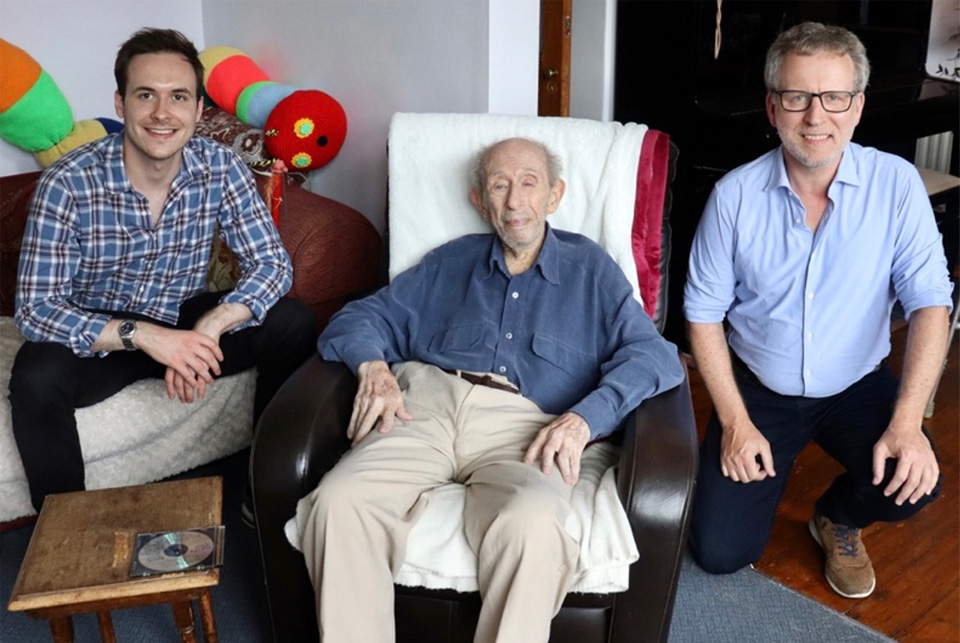
From left: Dominic Doutney, Eric Sanders and Norbert Meyn, August 5, 2021 Image: Norbert Meyn
3. Eric’s memories about individual songs
More than 70 years after writing them, Eric understandably could not always remember the exact circumstances under which his songs were written. However, he shared with us some memories about specific songs, which I would like to pass on here.
Little Coffee Bar
This song was one of Eric’s favourites. When he taught at the Hammersmith Day College in the early 1950s, he was also a passionate footballer, and once a week joined in a football match arranged by the P.E. teacher. They became friends and went out together.
One of the coffee bars they went to had a cellar where one could sit on the floor (covered with straw, or similar materials) and some of the guests took turns in sing and perform with instruments (mostly guitars). The bar upstairs was cosy and had a very pleasant staff. Eric wrote this tune in memory of it, and while the words do not describe it correctly in detail, they reflect Eric’s liking for it.’7 In a subsequent meeting Eric also mentioned that he may have been inspired to write it by a Viennese Schlager, In einem kleinen Cafe in Hernals (which mentions an English Waltz).8
"When I’m weary, I know what to do,
To leave trouble behind me and forget the chase.
And if someone asks for me, hoping to see me,
Tell him he’ll find me at my favourite place.
Where the cosy turnings are,
There’s a little coffee bar,
There I go whenever I’ve the time to spare.
There’s an atmosphere of bright and cheerful colours
And what’s more, there’s such a pretty waitress there.
And a continental tune, gently drifting through the room,
Forms the background to a dreamer’s reverie.
And when the girl behind the counter smiles,
There’s nowhere else I would be,
Than at the little coffee bar, that’s romance for me."
Come back to Soho (dedicated to Margaret with love)
Margaret, the dedicatee of this song, was Eric’s wife. During the war, in the Army, he was stationed outside Weymouth, where he was working in the woods with the Royal Engineers at a sawmill and cutting trees for the war effort. While studying for a Pitman’s correspondence course for the London University matriculation, he was inspired to apply to became a teacher, after an advert on stated that after the war there would be a shortage of teachers. He was offered a place at the Emergency Teachers Training College in Weymouth at the seaside. ‘Emergency’ because it was a 13 months’ course instead of two years. The students were a great mix of ages and background, including a group of nuns. Margaret was one of the students. They both attended the Social Study course together. They both enjoyed dancing and as their friendship grew, he wrote a waltz: “Today the World is a wonderful song” for her, invited her to a boat ride on the sea and sang it to her. When they were married, Eric wrote several songs for her birthdays. ‘Come back to Soho’ was written after Eric and Margaret had attended a show in Soho which Margaret liked a lot.9
"As I walked away from Soho Square
In my heart I felt a tug of care,
And a thousand voices seemed to say
Torna me! Retournez!
Come back to Soho, where wine is red and sweet.
Come back to Soho, where all the nations meet.
Park your heart in Soho Square, where the lovely dreams are made.
To a trembling mandolino’s serenade.
You’ll eat ravioli, you’ll dance by candlelight,
And Gypsy music will thrill the starlit night.
With that continental, sentimental London sky above,
Come back to Soho and fall in love!"
Crash! Bang!
We do not know anything about the conception of this song, however, it is worth mentioning that it does make a reference to the ‘independent air’ of the man of Monte-Carlo, who appears in the popular British music hall song ‘The man who broke the bank at Monte-Carlo'.
"I’m shaken, I’m hit, I’m bewildered, I admit,
I’m up the creek, round the bend, this is it:
Like the man of Monte Carlo with an independent air,
I used to walk about another wolf in camel hair,
‘Till Crash, Bang, I ran right into you,
And gone was my independent air.
Oh I used to be so proud because my heart was fancy free,
I always said the ties of love had not been made for me,
‘Till Crash, Bang, I lost my heart to you,
And that was the end of liberty.
It happened all so fast, it took my breath away,
I didn’t have the chance to pass the time of day.
A stab into my unsuspecting heart, and I lost it in a rush.
Only yesterday I laughed and said that true love wasn’t true,
I called it sentimental stuff which shows how much I knew,
For Crash, Bang, I fell in love with you,
And oh, what a terrible thing to do!
2nd time: And oh, what a wonderful, oh what a beautiful,
oh what a marvellous thing to do!"
Fallen in love am I
This song was inspired by a holiday encounter when Margaret and Eric visited Germany, most likely the city of Wiesbaden. The couple meet a young woman, who joined them on several occasions in and out of in the hotel. She wanted to practice her English, which Eric remembered was really quite good but she occasionally made funny mistakes and spoke quite loudly. Eric wrote the song back home when he and Margaret remembered the holiday.’10
"Last summer I went to Bavaria,
to a charming little town.
There I used to spend some evenings
Slowly strolling up and down.
One night I encountered a Fräulein,
Full of life and full of go.
Who without much ado,
Said ‘I must telling you,
Surely you vish to know:
(With a German accent:)
All the time I must singing
I know exactly why,
Trallala, trallala, hideereedi,
Fallen in love am I.
In my heart it is ringing,
Like the bells from the sky,
Trallala, trallala, hideereedi,
Fallen in love am I.
Since I met this wunderbarer boy,
My heart is filled with wunderbarer joy,
It is true, he is not very cute,
But his kissing ist so goot!!
I am so full of feeling,
It makes me nearly cry.
Trallala, trallala, hideereedi,
Fallen in love am I."
Wiener Schnitzel
This song was written with a singing TV chef in mind, in the hope he might be interested in it. Sadly, Eric could not remember if he ever sent it to him, it is likely that his programme had ceased by the time the song was finished.11 The song is a complete recipe for Wiener Schnitzel. Please note that the veal can be replaced with pork or chicken!
"Here's a recipe from Vienna
Of a dish that I love best.
It is called a Wiener Schnitzel,
Hard to pronounce, but easy to digest.
You need two thin slices of meat
From a well-boned leg of veal.
Then some flower, and an egg, well beaten.
And remember, fine breadcrumbs are essential for this meal.
Follow up with some pepper and salt,
But be careful, not too much.
With a mallet beat the slices of meat,
And don’t halt till they’re slender, and they’re tender to the touch.
Now they’re tasty and good-looking
And absolutely ready for the cooking.
Cook the slices in hot butter,
Till they are a golden brown,
Turn them over doing both sides,
That’s how it’s done in Vienna town.
Rice or Potatoes as a side dish
And a lemon slice or two.
Wiener Schnitzel, Wiener Schnitzel,
Makes a gourmet’s dream come true!"
I shall never forget Vienna
In 1955, Eric was teaching at a day college whose students, all teenagers, were already at work and sent by their employers one day a week to continue their general education. In July that year he organised a trip to Vienna for some 20 of the mixed students. It was a great experience for them, the programme included the Vienna Woods a Hungarian restaurant, a Danube trip and the Prater, a famous amusement park. Eric had a small accordion and the group sometimes settled somewhere for a sing-song. Before they left Vienna, they watched the departure of the British occupation army, which had been very popular with the Viennese.
When they were in the train back to London, Eric learned that two of the girls in the party had met and gone out with two British soldiers of the occupation army and were very happy as well as unhappy. Within the first half hour of the journey, he wrote this song, walked through the carriages which his group occupied, and performed the song to the two girls, who broke into tears. Eric called this a never forgotten memory.12 What is striking is that the song could just as well be about Eric’s own sense of loss, having been forced to flee and having lost his dream of becoming a professional musician.
"There is an ache deep in my heart
Makes me feel I could cry.
I shall never forget Vienna
Until the day I die.
Hard to believe, hard to conceive
How the days have gone by.
I shall never forget Vienna
Until the day I die.
I saw the sights, danced through the night,
And music filled my heart.
And life was sweet, and joy complete,
So why must I part?
Gone are the days, Gone is my dream.
Oh how lonely am I.
I shall never forget Vienna
Until the day I die."
Bring meine grüße nach wien
Eric wrote this song a few years after his arrival in Britain. He said he realised to his surprise that he missed his home city of Vienna, despite his strong feelings about the Austrians after his experience of antisemitism and Nazi persecution.13
1
"Ich glaub’ die Wolke,
die am Himmel da schwebt,
ist am Weg zu der Stadt wo ich einstmals gelebt.
Wolke, sei doch lieb zu mir
und nimm meine Botschaft mit dir.
Refrain
Bring meine Grüße nach Wien!
Bring sie den Strauß Melodien
Bring sie der Donau,
die einst war so blau.
Bring sie den Mädeln
da drunten in der Lobau.
Weinen, das kann ich nicht mehr.
Doch ist das Herz mir so schwer.
Wandernde Wolke,
ich kann heut nicht mit dir zieh’n,
so bring meine Grüße nach Wien."
2
"Manchmal im Leben
darf man wehmütig sein.
Die Vergangenheit
dringt in die Gegenwart ein.
Und ein bißchen Sehnsucht packt.
Wolke, mach für mich den Kontakt.
Translation (by Norbert Meyn)
1
I think the cloud
Which hovers there in the sky
Is on its way to the city
Where I once lived.
Cloud, please be kind to me
And take my message with you.
Refrain
Bring my greetings to Vienna!
Bring them to Strauss melodies
Bring them to the Danube,
Which once was so blue,
Bring them to the Girls
Down there in the Lobau plain.
I cannot cry anymore.
But my heart feels so heavy.
Wandering cloud,
I cannot go with you today.
So bring my greetings to Vienna.
2
Sometimes in life
One is allowed to be melancholic.
The past
Comes through into the present.
And a little longing takes hold.
Cloud, please make contact for me."
4. Story Maps
During the AHRC project Music, Migration and Mobility, Research Associate Michael Holden at Royal Holloway University of London created a series of interactive story maps about Eric Sanders. They include recordings of Eric’s songs based on this edition. We encourage you to explore the storymaps.
The maps are based on a series of interviews conducted by researcher Bernadette Edtmaier on behalf of the Austrian Cultural Forum, London, which can be accessed at the Austrian Media Library .These maps are predominantly based on Eric Sanders’s memories, although they are augmented throughout with references to relevant historical context and other details. In presenting memories, these storymaps represent an example of a kind of vicarious, or imaginary mobility, in which Sanders recalls the places of his past and the journeys he has made.

Screenshot from Eric Sanders Memory Map by Michael Holden
5. Further Reading – Autobiographies and Oral History
Eric wrote two autobiographies, one in English and one in German.
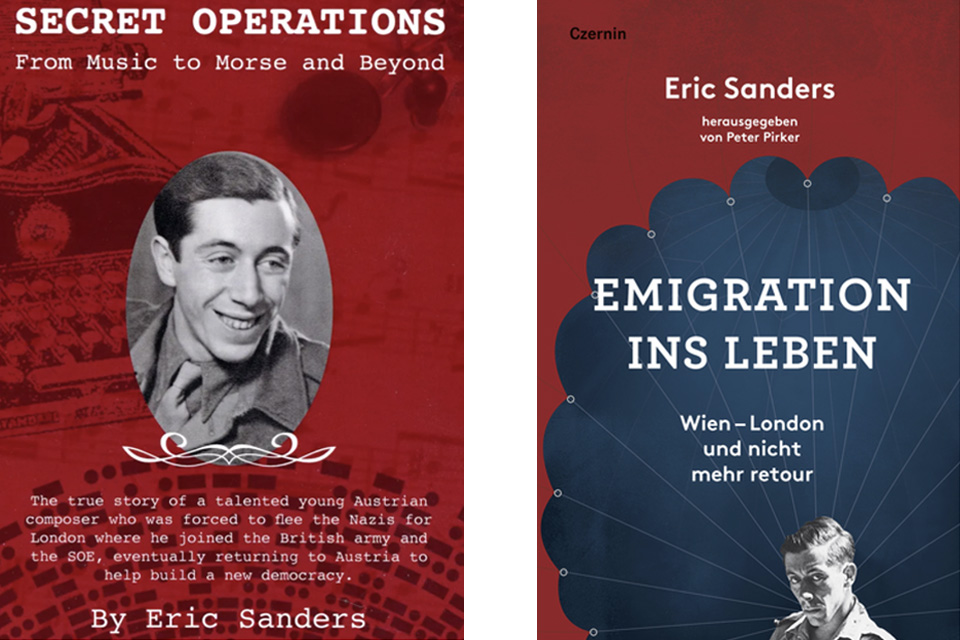
Interdisciplinary Research about Music, Migration and Mobility
The interactions between Eric Sanders and the project team of the Music, Migration and Mobility project became an important part of our interdisciplinary research. Developing arrangements and performances of Eric’s songs in the context of his life story and identity as a former refugee, teacher and campaigner for the Labour party helped us to reflect on the hidden links between music, identity, and place. By foregrounding Eric’s migration and mobility, particularly between Austria and Britain, we hope to inspire a fresh look at his musical output, which reflects this mobility far more than his geographical or cultural belonging to a single national culture.
For further information please see: Norbert Meyn, Peter Adey, and Nils Grosch. “Foregrounding Mobility Rather than Belonging: A Conceptual Framework for Engaging with Music Shaped by Transnational Migration.” Acta Musicologica 95, no. 1 (2023): 4–20.
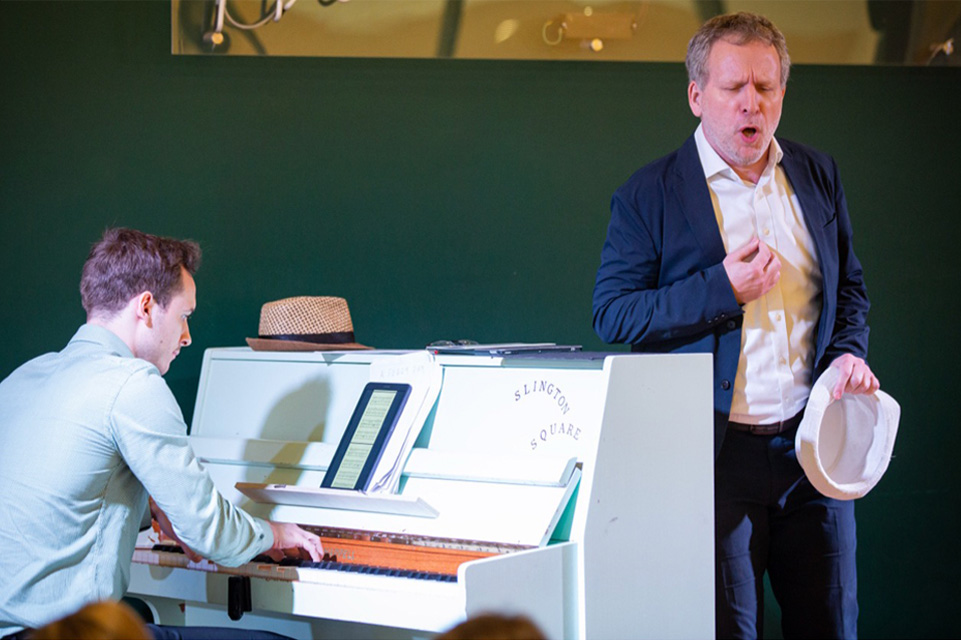
Dominic Doutney and Norbert Meyn performing songs by Eric Sanders in the 2021 Islington Festival (Image: Marc Gascoigne)
Further Reading – Autobiographies and Oral History
1: Eric Sanders, Secret Operations, autobiography published by Historyweb limited (ISBN 978095618310)
2: Eric Sanders, Emigration ins Leben, Wien-London und nicht mehr retour, herausgegeben von Peter Pirker, Czernin Verlag, Wien, https://www.czernin-verlag.com/buch/emigration-ins-leben
Endnotes
1Eric Sanders, Secret Operations, autobiography published by Historyweb limited (ISBN 978095618310), 66/67.
2Interview with Eric on August 5, 2021, audio file, time code 1.01
3Eric referred to himself as a melody man in our Interview in January 2021 (audio file), time code 01.00
4Interview with Eric Sanders, January 2021 (audio file), time code 26.30.
5Interview with Eric Sanders, January 2021 (audio file), time code 00.15
6The recording has been preserved as an oral history interview and can be accessed through the RCM Library
7Email received from Eric on January 2, 2021
8Final meeting recording, time code 4.30
9Email received from Eric on January 2, 2021
10Email received from Eric on January 2, 2021
11Email received from Eric on January 2, 2021
12Email received from Eric on Sept 29, 2020
13Interview with Eric on August 5, 2021, audio file, time code 1.01


